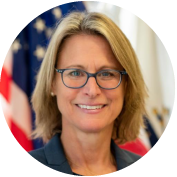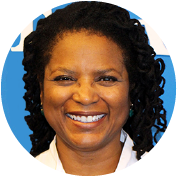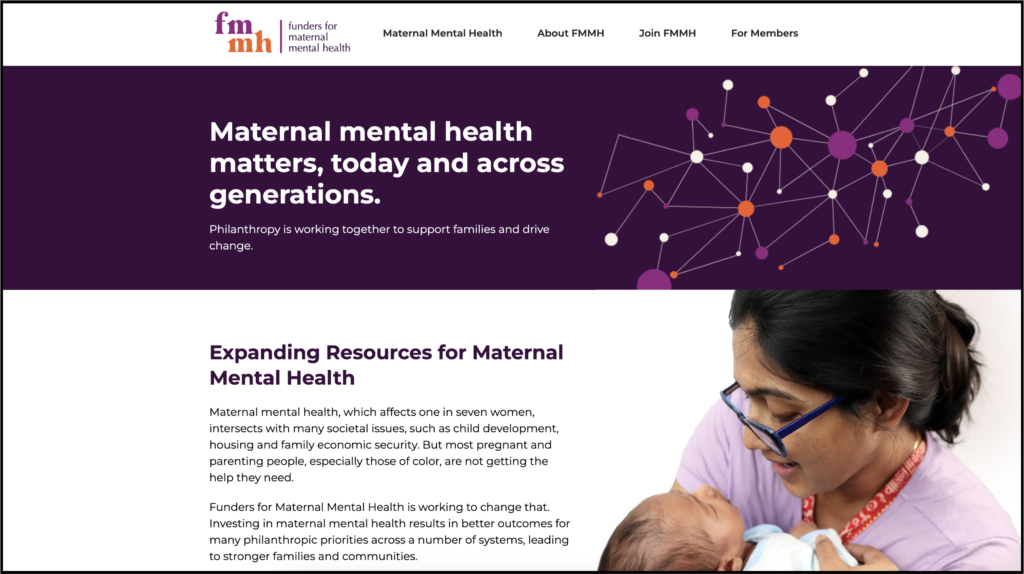Maternal Mental Health:
An Urgent Priority
30 Opportunities to Improve Maternal Mental Health and Promote Equity
Introduction
Millions of moms, pregnant women, and other birthing people experience mood disorders, anxiety, depression, post-traumatic stress disorder, or other maternal mental health issues every year. When moms struggle with perinatal depression or anxiety, children are more likely to struggle with social-emotional, cognitive, language, motor, and adaptive behavior development, and these obstacles can persist through adolescence. But it is possible to make real change.


Opportunities for Action
The diversity of factors affecting maternal mental health means that virtually all people and systems that interact with pregnant, postpartum, and parenting people can make a real difference.
We talked with experts in mental health and a range of sectors, who could help inform new and better solutions. They agreed that meaningful progress requires coordinated investments across many sectors, as well as a robust, connected and coordinated mental health advocacy field.
The full report elaborates on each critical theme that emerged, outlined below.
Maximize the impact of health care interventions.
Health systems change needs to happen at both the state and federal levels. That means prioritizing maternal mental health supports, coordinating across systems, and involving diverse providers in the care and well-being of pregnant people and new mothers.
Federal
- Integrate non-clinical providers as paid members of care teams.
- Implement cross-system financing or co-led service delivery pilots.
- Develop a coordinated federal strategy that cuts across silos.
- Develop a reform roadmap for states.
- Increase access to postpartum depression screening and treatment.
State
- Establish public-private maternal mental health commissions charged with improving outcomes and equity.
- Develop commission-led state policy roadmaps aligned with the above federal roadmap.
- Implement “no wrong door” to maternal mental health care and human services.
- Leverage Temporary Assistance to Needy Families (TANF) to mitigate family financial stress factors.
- Help doctors identify maternal mental health needs and make effective referrals.
- Address language barriers within health systems.
Broaden the response to address the full range of well-being obstacles.
Maternal mental health issues do not occur in isolation. It’s imperative to address social determinants of maternal mental health and facilitate access to treatment and prevention services. Collaboration between agencies and policy change are necessary to achieve these goals that are rooted in health equity.
- Identify case studies describing hospital system or health plan interventions that addressed social determinants of health, resulting in family well-being and mental health improvements.
- Facilitate “warm” referrals by health care providers to effective prevention services and interventions that address social determinants.
- Require collaboration between health agencies and aligned agencies (such as child welfare agencies) to approach maternal substance use from a public health perspective.
- Advance comprehensive policy reform agendas that address a wide range of issues impacting families’ mental health and health equity.
Build new community-centered maternal mental health support systems.
The people in the best position to define what supports birthing people need are those in the communities we serve. Community organizations need increased capacity, resourcing, and power to take a leadership role in efforts to identify the gaps and advance creative solutions.
- Convene collaborations led by community-based organizations that bring representatives of relevant systems (home visiting, domestic violence, health plans, TANF, etc.) together to recommend integrated supports for families.
- Cultivate community-based organizations’ power-building, so they can partner as equals with institutional health care sector leaders like health plans or insurers.
- Conduct community assessments and use findings to close care gaps.
- Cultivate public-private financing partnerships for pilot projects.
Center women of color and other historically-marginalized people.
Women of color and those with lower incomes are at an increased risk of experiencing maternal mental health issues. The health care system must adapt to serve the needs of these communities with culturally relevant, anti-racist care models informed by people they are meant to serve.
- Ensure that reform strategies are informed by anti-racist best practices, that these strategies reflect the experience of women of color, and that women of color have a substantive role in the development of financing models and policy reforms.
- Build more culturally-relevant, comprehensive, and accurate measurements.
- Commission a national survey of relevant programs.
- Advocates should push for increased Substance Abuse and Mental Health Services Administration (SAMHSA) and Health Resources and Services Administration (HRSA) funding for community-based maternal mental health supports.
Expand advocacy to influence and accelerate policy change.
Maternal mental health is a complex issue; those in a position to make change often don’t have a full understanding of it. Advocates and stakeholders are key to lifting up the nuances of what maternal mental health is, whom it most affects, and how to advance equitable change.
- Ensure that maternal mental health advocates and stakeholders have a seat and voice at key advocacy coalition tables.
- Convene an advocacy network focused on federal maternal mental health funding.
- Complete a scan of media coverage.
- Implement a narrative change effort.
- Make a communication plan.
- Develop stories of action, system change, and health.
- Make better use of social media
Contributing Experts
To reimagine America’s approach to maternal mental health, Perigee Fund commissioned a series of six facilitated strategy sessions with some of the most creative thinkers and change agents in and around the issue. We thank these dedicated individuals for sharing their time, energy, and expertise to help us advance this issue.
- Dr. Ifeyinwa Asiodu
 Dr. Ifeyinwa Asiodu is an Assistant Professor in the Department of Family Health Care Nursing at University of California, San Francisco School of Nursing. As a researcher, registered nurse and lactation consultant, the goal of her program is to reduce infant feeding disparities and increase access to breastfeeding care and equitable contraception services for Black women.
Dr. Ifeyinwa Asiodu is an Assistant Professor in the Department of Family Health Care Nursing at University of California, San Francisco School of Nursing. As a researcher, registered nurse and lactation consultant, the goal of her program is to reduce infant feeding disparities and increase access to breastfeeding care and equitable contraception services for Black women. - Sarah Axelson
 Sarah Axelson, MSW, is the Interim Head of Programs at Power to Decide, where among other projects she manages the Innovation Next program, supporting innovative technology-based solutions to preventing teen pregnancy and improving adolescent health.
Sarah Axelson, MSW, is the Interim Head of Programs at Power to Decide, where among other projects she manages the Innovation Next program, supporting innovative technology-based solutions to preventing teen pregnancy and improving adolescent health. - Dr. Priya Batra
 Dr. Priya Batra has served as Senior Medical Director – Family and Community Health at Inland Empire Health Plan since 2017, where she provides clinical expertise as a board-certified Obstetrician-Gynecologist. Since completing her MD at Columbia, and her clinical training at UCLA, she has provided full-scope care to women in both academic and care settings.
Dr. Priya Batra has served as Senior Medical Director – Family and Community Health at Inland Empire Health Plan since 2017, where she provides clinical expertise as a board-certified Obstetrician-Gynecologist. Since completing her MD at Columbia, and her clinical training at UCLA, she has provided full-scope care to women in both academic and care settings. - Jamie Belsito
 Jamie Belsito is the Maternal Mental Health Leadership Alliance’s Federal Policy Director and Founder, former Commissioner on the Ellen Story Special Commission on Postpartum Depression in Massachusetts and a Trustee at Salem State University. As Advocacy Chair for the National Coalition for Maternal Mental Health, Belsito helped pass the Bringing Postpartum Depression Out of the Shadows Act.
Jamie Belsito is the Maternal Mental Health Leadership Alliance’s Federal Policy Director and Founder, former Commissioner on the Ellen Story Special Commission on Postpartum Depression in Massachusetts and a Trustee at Salem State University. As Advocacy Chair for the National Coalition for Maternal Mental Health, Belsito helped pass the Bringing Postpartum Depression Out of the Shadows Act. - Dr. Carrie Brown
 Dr. Carrie Brown is the Chief Medical Officer for Behavioral Health Intellectual and Developmental Disabilities for the North Carolina Department of Health and Human Services. She is an associate professor of psychiatry at UNC, a consulting assistant professor of psychiatry at Duke, and a research fellow with the Cecil G. Sheps Center for Health Services Research at UNC.
Dr. Carrie Brown is the Chief Medical Officer for Behavioral Health Intellectual and Developmental Disabilities for the North Carolina Department of Health and Human Services. She is an associate professor of psychiatry at UNC, a consulting assistant professor of psychiatry at Duke, and a research fellow with the Cecil G. Sheps Center for Health Services Research at UNC. - Joy Burkhard
 Joy Burkhard is the Founder and Executive Director of 2020 Mom, a nonprofit social change organization aggressively working to close gaps in maternal mental health through education, awareness, and advocacy. Burkhard is a member of the American College of Obstetrics and Gynecology expert workgroup on Maternal Mental Health and the California Maternal Quality Care Collaborative.
Joy Burkhard is the Founder and Executive Director of 2020 Mom, a nonprofit social change organization aggressively working to close gaps in maternal mental health through education, awareness, and advocacy. Burkhard is a member of the American College of Obstetrics and Gynecology expert workgroup on Maternal Mental Health and the California Maternal Quality Care Collaborative. - Dr. Joia Adele Crear-Perry
 Dr. Joia Adele Crear-Perry, FACOG, is the Founder and President of the National Birth Equity Collaborative. She is most known for her work to remove Race as a risk factor for illnessrnlike premature birth and replacing it with Racism. Dr. Crear-Perry completed her medical degree at Louisiana State University and her residency in Obstetrics and Gynecology at Tulane University’s School of Medicine.
Dr. Joia Adele Crear-Perry, FACOG, is the Founder and President of the National Birth Equity Collaborative. She is most known for her work to remove Race as a risk factor for illnessrnlike premature birth and replacing it with Racism. Dr. Crear-Perry completed her medical degree at Louisiana State University and her residency in Obstetrics and Gynecology at Tulane University’s School of Medicine. - Dr. Twylla Dillion
 Twylla Dillion, MBA, is the Executive Director of HC One. She brings 10+ years of nonprofit experience spanning philanthropy, Medicaid reform, maternal-child health, data analytics, and academia. Dr. Dillion has conducted research on breastfeeding, served as Program Officer for maternal-child health programs, and worked as a research lead on a Patient Centered Outcomes Research Institute.
Twylla Dillion, MBA, is the Executive Director of HC One. She brings 10+ years of nonprofit experience spanning philanthropy, Medicaid reform, maternal-child health, data analytics, and academia. Dr. Dillion has conducted research on breastfeeding, served as Program Officer for maternal-child health programs, and worked as a research lead on a Patient Centered Outcomes Research Institute. - Indivar Dutta-Gupta
 Indivar Dutta-Gupta is Co-Executive Director of the Georgetown Center on Poverty u0026 Inequality (GCPI), where he leads work to develop and advance policy recommendations that alleviate poverty and inequality, advance racial and gender equity, and expand economic inclusion for all people in the United States.
Indivar Dutta-Gupta is Co-Executive Director of the Georgetown Center on Poverty u0026 Inequality (GCPI), where he leads work to develop and advance policy recommendations that alleviate poverty and inequality, advance racial and gender equity, and expand economic inclusion for all people in the United States. - Dr. Janina Fariñas
 Dr. Janina Fariñas is the Founder and Chief Executive of the La Cocina program(s) for Latinx community health and the Mil Dias de Amor infant mental health program. As a pediatric neuropsychologist and a family therapist, Dr. Fariñas’ areas of clinical and research expertise include infant mental health, Latinx health equity, and community mental health.
Dr. Janina Fariñas is the Founder and Chief Executive of the La Cocina program(s) for Latinx community health and the Mil Dias de Amor infant mental health program. As a pediatric neuropsychologist and a family therapist, Dr. Fariñas’ areas of clinical and research expertise include infant mental health, Latinx health equity, and community mental health. - Kate Langrall Folb
 Kate Langrall Folb comes to Hollywood, Health u0026 Society after working for 20+ years in entertainment education. After working as Director of Special Projects at the Scott Newman Center she spent nearly 10 years as Director of the Media Project, which addressed portrayals of adolescent reproductive health in the media.
Kate Langrall Folb comes to Hollywood, Health u0026 Society after working for 20+ years in entertainment education. After working as Director of Special Projects at the Scott Newman Center she spent nearly 10 years as Director of the Media Project, which addressed portrayals of adolescent reproductive health in the media. - Dr. Olivia Golden
 Dr. Olivia Golden, former Assistant Secretary for Children and Families at the U.S. Department of Health and Human Services, became the Executive Director of the Center for Law and Social Policy (CLASP) in 2013. Olivia testifies before Congress on the importance of the safety net and economic security for children, families, and individuals.
Dr. Olivia Golden, former Assistant Secretary for Children and Families at the U.S. Department of Health and Human Services, became the Executive Director of the Center for Law and Social Policy (CLASP) in 2013. Olivia testifies before Congress on the importance of the safety net and economic security for children, families, and individuals. - Tamar Magarik Haro
 Tamar Magarik Haro has spent more than 17 years working in health care policy, public health, and advocacy. Tamar serves as Senior Director of Federal and State Advocacy at the American Academy of Pediatrics (AAP) where she leads federal legislative advocacy and regulatory initiatives on a variety of child health issues.
Tamar Magarik Haro has spent more than 17 years working in health care policy, public health, and advocacy. Tamar serves as Senior Director of Federal and State Advocacy at the American Academy of Pediatrics (AAP) where she leads federal legislative advocacy and regulatory initiatives on a variety of child health issues. - Sinsi Hernández-Cancio
 Sinsi Hernández-Cancio, JD, is Vice President at the National Partnership for Women u0026 Families, leading the Health Justice team. She is a national healthrnand health care equity policy and advocacy thought leader and has presented at national events across the country and served on numerous advisory committees.
Sinsi Hernández-Cancio, JD, is Vice President at the National Partnership for Women u0026 Families, leading the Health Justice team. She is a national healthrnand health care equity policy and advocacy thought leader and has presented at national events across the country and served on numerous advisory committees. - Dr. Myra Jones-Taylor
 Dr. Myra Jones-Taylor is the Chief Policy Officer at ZERO TO THREE, the national leader on infant-toddler policy and program development. There, she leads the development and implementation of the organization’s policy agenda, priorities and strategies. Prior to this role, Dr. Jones-Taylor served as Connecticut’s founding Commissionerrnof Early Childhood.
Dr. Myra Jones-Taylor is the Chief Policy Officer at ZERO TO THREE, the national leader on infant-toddler policy and program development. There, she leads the development and implementation of the organization’s policy agenda, priorities and strategies. Prior to this role, Dr. Jones-Taylor served as Connecticut’s founding Commissionerrnof Early Childhood. - Dr. Nat Kendall-Taylor
 Dr. Nat Kendall-Taylor, is Chief Executive Officer at the FrameWorks Institute, a research think tank in Washington, DC. He leads a multi-disciplinary team in conducting research on public framing of social issues and supporting nonprofit organizations. A psychological anthropologist, he publishes and lectures on communications research in the popular and professional press.
Dr. Nat Kendall-Taylor, is Chief Executive Officer at the FrameWorks Institute, a research think tank in Washington, DC. He leads a multi-disciplinary team in conducting research on public framing of social issues and supporting nonprofit organizations. A psychological anthropologist, he publishes and lectures on communications research in the popular and professional press. - Amy Kershaw
 Amy Kershaw is Commissioner for the Massachusetts Department of Transitional Assistance and has many years of experience in senior positions within Child Welfare and Early Education and Care agencies. Most recently, as Associate Commissioner for Economic Assistance and Employment, Kershaw was responsible for overseeing the state’s TANF program and all SNAP related employment programs.
Amy Kershaw is Commissioner for the Massachusetts Department of Transitional Assistance and has many years of experience in senior positions within Child Welfare and Early Education and Care agencies. Most recently, as Associate Commissioner for Economic Assistance and Employment, Kershaw was responsible for overseeing the state’s TANF program and all SNAP related employment programs. - Krya Kyles
 Kyra Kyles is the CEO at YR Media, an award-winning national nonprofit serving youth storytellers. Among her media roles, Kyles served as EBONY Editor-in-Chief and Senior Vice President, Head of Digital Editorial and while at sibling pub, JET, launched the iconic brand’s first-ever app.
Kyra Kyles is the CEO at YR Media, an award-winning national nonprofit serving youth storytellers. Among her media roles, Kyles served as EBONY Editor-in-Chief and Senior Vice President, Head of Digital Editorial and while at sibling pub, JET, launched the iconic brand’s first-ever app. - Courtney Lee-Ashley
 Courtney Lee-Ashley is with Novartis as a Director of Federal Government Affairs. Previously, she had roles in government Affairs at Merck and the Pharmaceutical Research and Manufacturers of America (PhRMA), where she began working on legislative issues on behalf of the innovative pharmaceutical industry.
Courtney Lee-Ashley is with Novartis as a Director of Federal Government Affairs. Previously, she had roles in government Affairs at Merck and the Pharmaceutical Research and Manufacturers of America (PhRMA), where she began working on legislative issues on behalf of the innovative pharmaceutical industry. - Dr. Michael Lu
 Dr. Michael Lu, Dean of the UC Berkeley School of Public Health, has dedicated hisrnresearch to a new theory on the origins of maternal and child health disparities. Dr. Lu was the Director of the Maternal and Child Health Bureau for the U.S. Department of Health and Human Services, where he transformed key federal programs in maternal and child health.
Dr. Michael Lu, Dean of the UC Berkeley School of Public Health, has dedicated hisrnresearch to a new theory on the origins of maternal and child health disparities. Dr. Lu was the Director of the Maternal and Child Health Bureau for the U.S. Department of Health and Human Services, where he transformed key federal programs in maternal and child health. - Kristen Marston
 Kristen Marston is skilled at translating social issues from communities into film, TV, and advertising projects. To date, she has advised on over 50 entertainment projects across networks through working with writers, executives, researchers, and advertisers to create media that is reflective of women, Black people, communities of color, and the issues that affect them.
Kristen Marston is skilled at translating social issues from communities into film, TV, and advertising projects. To date, she has advised on over 50 entertainment projects across networks through working with writers, executives, researchers, and advertisers to create media that is reflective of women, Black people, communities of color, and the issues that affect them. - Kay Matthews
 Kay Matthews is the Founder of The Shades of Blue Project. She graduated with a 2-year Degree in Early Childhood Development from North Harris College in Houston and subsequently became a Licensed Community Health Worker. She has received numerous awards from both her community and peers and sits on the board and is partners with several national organizations.
Kay Matthews is the Founder of The Shades of Blue Project. She graduated with a 2-year Degree in Early Childhood Development from North Harris College in Houston and subsequently became a Licensed Community Health Worker. She has received numerous awards from both her community and peers and sits on the board and is partners with several national organizations. - Stephanie Quinn
 Stephanie Quinn serves as Senior Vice President and oversees the American Academy of Family Physicians Divisions of Government Relations and Practice Advancement as well as the Robert Graham Center for Policy Studies in Family Medicine and Primary Care. She directs legislative and private sector advocacy on issues such as value-based models of care and increasing health care access.
Stephanie Quinn serves as Senior Vice President and oversees the American Academy of Family Physicians Divisions of Government Relations and Practice Advancement as well as the Robert Graham Center for Policy Studies in Family Medicine and Primary Care. She directs legislative and private sector advocacy on issues such as value-based models of care and increasing health care access. - Rinku Sen
 Rinku Sen is a writer and social justice strategist. She is formerly the Executive Director of Race Forward, generating impactful racial justice successes, including Drop the I-Word, a campaign for media outlets to stop referring to immigrants as “illegal,” which was adopted by the Associated Press, USA Today, LA Times, and more.
Rinku Sen is a writer and social justice strategist. She is formerly the Executive Director of Race Forward, generating impactful racial justice successes, including Drop the I-Word, a campaign for media outlets to stop referring to immigrants as “illegal,” which was adopted by the Associated Press, USA Today, LA Times, and more. - Marjorie Simms
 Marjorie Sims, Managing Director of Ascend at the Aspen Institute, has 20+ years of experience advancing the status of women and families at local, state, national, and international levels. She formerly served as Program Officer at the W.K. Kellogg Foundation with focus on family economic security programs, and she managed a $65M grant portfolio.
Marjorie Sims, Managing Director of Ascend at the Aspen Institute, has 20+ years of experience advancing the status of women and families at local, state, national, and international levels. She formerly served as Program Officer at the W.K. Kellogg Foundation with focus on family economic security programs, and she managed a $65M grant portfolio. - Bill Smith
 Bill Smith is a founding partner of Civitas Public Affairs Group, a values-based firm working on some of the most pressing societal challenges of our day. He has over tworndecades of experience in campaign management, messaging research, and communications, and movement building. Smith is also the founder of Inseparable, a new advocacy organization for mental health.
Bill Smith is a founding partner of Civitas Public Affairs Group, a values-based firm working on some of the most pressing societal challenges of our day. He has over tworndecades of experience in campaign management, messaging research, and communications, and movement building. Smith is also the founder of Inseparable, a new advocacy organization for mental health. - Dr. Megan Smith
 Dr. Megan Smith is an Associate Professor in the Departments of Psychiatry u0026 the Child Study Center at the Yale School of Medicine and in Social u0026 Behavioral Sciences in the Yale School of Public Health. Dr. Smith’s research interest has been in community-partnered and systems research in maternal mental health and racial, ethnic, and gender-based disparities in mental health and illness.
Dr. Megan Smith is an Associate Professor in the Departments of Psychiatry u0026 the Child Study Center at the Yale School of Medicine and in Social u0026 Behavioral Sciences in the Yale School of Public Health. Dr. Smith’s research interest has been in community-partnered and systems research in maternal mental health and racial, ethnic, and gender-based disparities in mental health and illness. - Ralph Smith
 As Managing Director of the Campaign for Grade-Level Reading since 2010, Ralph Smith has focused on intergenerational poverty, with his work grounded in researchrnhighlighting the alarming number of children who are not reading proficiently byrnthird grade and the long-term consequences for society. He formerly served as Senior Vice President at the Annie E. Casey Foundation.
As Managing Director of the Campaign for Grade-Level Reading since 2010, Ralph Smith has focused on intergenerational poverty, with his work grounded in researchrnhighlighting the alarming number of children who are not reading proficiently byrnthird grade and the long-term consequences for society. He formerly served as Senior Vice President at the Annie E. Casey Foundation. - Isha Weerasinghe
 Isha Weerasinghe is a Senior Policy Analyst within CLASP’s youth team and led CLASP’s technical assistance work in mental health for youth and young adults and mothers over the past three years and works on related federal legislative and regulatory advocacy. Weerasinghe previously worked as the Director of Policy and Advocacy at the Association for Asian Pacific Community Health Organizations (AAPCHO).
Isha Weerasinghe is a Senior Policy Analyst within CLASP’s youth team and led CLASP’s technical assistance work in mental health for youth and young adults and mothers over the past three years and works on related federal legislative and regulatory advocacy. Weerasinghe previously worked as the Director of Policy and Advocacy at the Association for Asian Pacific Community Health Organizations (AAPCHO).
*The bios included here were accurate at the time of the strategy sessions. A number of leaders have since changed organizational affiliations and titles.
Editor in Chief
- Elizabeth Krause, ScM, Director of Programs, Perigee Fund
Contributing Authors
- Shelley Waters Boots, Principal, SWB Strategic Solutions
- Lena O’Rourke, Principal, O’Rourke Health Policy Strategies
- Ed Walz, Partner, Springboard Partners

A Step Toward Action
Informed and inspired by the strategy sessions and the recognition that opportunities for action require resources, a collaborative of philanthropic funders who prioritize maternal mental health, including Perigee Fund, launched Funders for Maternal Mental Health at the end of 2021. Investing in maternal mental health results in better outcomes for many philanthropic priorities across a number of systems, leading to stronger families and communities.
